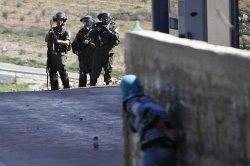A one-state solution in Palestine/Israel is a subject being increasingly discussed and debated. One way in which the conversation has emerged is through an analysis of the current situation as a de facto one state, a regime which privileges Jews above Palestinians (the latter being granted or denied different rights according to geography and legal status).
This challenges the orthodoxy that makes a clean distinction between Israel and the Occupied Palestinian Territories. In doing so, it not only provides a framework for interpreting various policies, but also counters the fragmentation of Palestinians over the decades into "Israeli Arabs", "West Bank" or "Gaza" Palestinians, Jerusalemites - and of course, refugees.
But apart from this discursive "reintegration", as the apartheid regime has been consolidated irrespective of the "Green Line", a new generation of Palestinian activists is breaking down old divisions imposed by Israel and forging new connections and strategies of resistance.
Lana Khaskia is an activist from Haifa. Last October, she worked alongside other comrades to organize a hunger strike in support of Palestinian prisoners. The action went under the name "Hungry for Freedom", a slogan Lana says covers "many demands that can be summarized in one demand: ending Zionist colonialism in all of historic Palestine".
That broad definition of "freedom" was matched by "one of the most important achievements" of the action, namely, “making links with many Palestinian groups both inside and outside Palestine". Lana recalls how they got a phone call from activists in Gaza that "became a sort of demonstration, with each side shouting slogans to the other - about ending the siege on Gaza and for a return to Haifa".
More recently, the hunger strike of Khader Adnan sparked a similar burst of coordinated activity among Palestinians. Blogger Jalal Abukhater described to me how "West Bank-based Palestinians would have their main demonstration at Ofer Prison. Gaza Palestinians would gather in Al-Jundi Square in Gaza City and 48 Palestinians would demonstrate in front of Ziv Hospital in Safad, where Khader Adnan was held".
That sort of coordination, Jalal notes, has been "made easier through the use of social media" and enabled Palestinians to be "united in their action despite occupation's policy of geographical separation". Online communication technology, famously (and excessively) credited for its role as an activists' tool in the Arab uprisings, is having an impact in Palestine, breaching walls and checkpoints that divide and separate.
Abir Kopty is another Palestinian blogger and activist who is taking advantage of the way in which social media can facilitate coordinated actions. "Communicating online", Abir says, "is enabling our voices to be heard directly without agents who claim to represent us. And when we have this space to represent ourselves, we become very creative in our ways of taking action."
These remarks point to how the changes go deeper than Facebook and Twitter - there is a shift in the mindset amongst a new generation that is, in Abir's words, "less tied to the traditional modes of thinking and acting based on the fragmentation and division of the Palestinian people".
This increased organization and coordination between Palestinian youth has defied not just physical walls but also, in the words of Budour Hassan, a fourth-year law student at the Hebrew University in Jerusalem, "a psychological wall constructed by the apartheid system and fortified by prejudices and stereotypes". Prior to her participation in protests in West Bank villages, Budour relates, she had "barely been in touch with any West Bank Palestinians".
For now, these flourishing connections are still restricted to youth activists. But Ameer Makhoul, writing from his Israeli jail cell, highlighted how a campaign like the one for Khader Adnan "illustrated how the components of popular struggle can be brought together". After all, as Janan Abdu, an activist and researcher (and Ameer's wife), put it to me, "the connection and cooperation between Palestinians are natural, as one people that was separated by the Nakba and military regime".
As the peace process stalls and stagnates, it is easy to look at events in Palestine/Israel and see only unimpeded Israeli colonization, coupled with a lack of legitimate, empowering leadership to marshal Palestinian efforts at resistance. This gloomy picture is accurate - but it misses out the signs of hope that are emerging at a grassroots level.
PHOTO CAPTION
A stone-throwing Palestinian demonstrator hides behind a wall as Israeli security officers stand guard during clashes at a weekly protest against a nearby Jewish settlement, in the West Bank village of Nabi Saleh, near Ramallah March 9, 2012.
By Ben White
Source: Aljazeera.com


 Home
Home Discover Islam
Discover Islam Quran Recitations
Quran Recitations Lectures
Lectures
 Fatwa
Fatwa Articles
Articles Fiqh
Fiqh E-Books
E-Books Boys & Girls
Boys & Girls  Ramadan
Ramadan Fatwa Audios
Fatwa Audios Month of Mercy
Month of Mercy Women
Women Eed Al- Fitr
Eed Al- Fitr Food Recipes
Food Recipes Videos
Videos

 Prayer Times
Prayer Times












